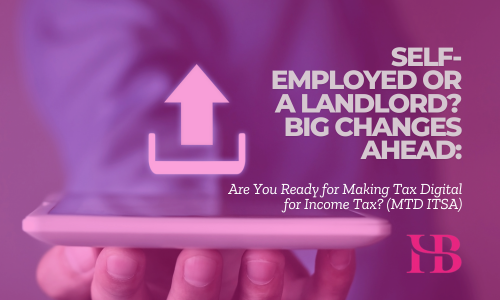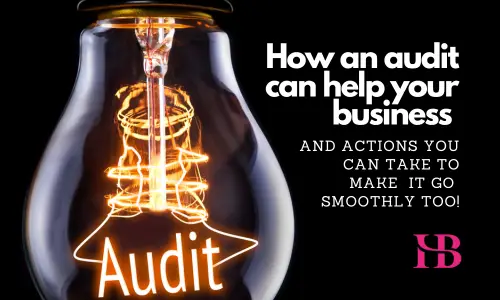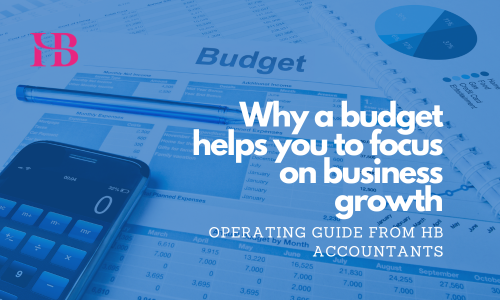From 6 April 2026, Making Tax Digital for Income Tax (MTD ITSA) will transform the way self-employed individuals and landlords manage their tax affairs. If you earn income through self-employment or property rentals, you’ll need to keep digital records and submit updates to HMRC every quarter. While payment deadlines remain the same, the shift to more frequent reporting means you’ll need to stay on top of your bookkeeping because the way you report your earnings is changing – are you prepared?

Who Is Affected by Making Tax Digital for Income Tax (MTD ITSA)?
MTD ITSA applies to self-employed individuals and landlords with gross qualifying income exceeding £50,000 from April 2026 and income exceeding £30,000 from April 2027. Here, qualifying income refers to combined sole trade and property income measured before deducting expenses. For jointly held income (for example, a rental property owned equally by a couple), only each individual’s share of the gross income is considered.
Exemptions:
- Individuals lacking a National Insurance number on 31 January will automatically be exempt for the following tax year.
- Those who are digitally excluded may also claim an exemption, although the precise application process is yet to be confirmed.
For now, sole traders and landlords with a turnover of £30,000 or less will continue under the current Self-Assessment system. The Autumn Budget 2024 indicated that those with turnovers between £20,000 and £30,000 would be brought into MTD ITSA by the end of this Parliament, but a specific date has not been set.
Partnerships (including LLPs): and their individual members are not yet included, though non-partnership income exceeding the thresholds would fall under MTD ITSA.
Limted Companies: are excluded from MTD ITSA, and it remains uncertain when Corporation Tax might be incorporated.
MTD ITSA Roll out Timeline
Making Tax Digital for Income Tax (MTD ITSA) will be implemented in two phases:
- Phase 1 (from April 2026): Applies to individuals with gross qualifying income above £50,000.
- Phase 2 (from April 2027): Applies to individuals with gross qualifying income above £30,000.
The income thresholds are determined based on the most recent tax return filed before the mandation date. For example, if a 2024/25 tax return (due by 31 January 2026) reports gross qualifying income above £50,000, the taxpayer will be required to join MTD ITSA from 6 April 2026. If a new income source began during the year, the reported figure will need to be adjusted to reflect a full 12-month period when comparing it against the threshold.
Reliefs and Allowances
Income exempt from reporting, because it is covered by reliefs or allowances (such as Rent a Room relief or trading/property allowances) will not count toward the thresholds. However, if a taxpayer is required to join MTD ITSA, they must comply with the digital record keeping for all sources of trade and property income, including those covered by such reliefs.
Key Components of MTD ITSA
MTD ITSA consists of three main elements:
- Digital Record Keeping:
- Taxpayers must maintain digital records detailing the amount, category, and date of income and expenses for their sole trade and/or property businesses.
- Records can be maintained using MTD compatible software or spreadsheets via tailored bridging software.
2. Quarterly Updates:
- Every quarter, taxpayers must submit a summary of their income and expenses to HMRC, drawn from their digital records.
- These summaries are not full tax returns; they merely provide totals for each category, without mandatory accounting or tax adjustments.Each trade or property business requires its own quarterly submission. For example, a sole trader who also rents out a property might have to submit separate updates for each source.By default, quarterly periods align with the tax year (eg the first quarter from 6 April to 5 July, with submissions due by 7 August), though taxpayers may elect to use calendar quarters (eg 1 April to 30 June, with the same filing deadlines).
- Updates are cumulative, meaning errors in one quarter can be corrected in the subsequent submission.
MTD ITSA: Year-End Declaration
- After the final quarterly update, taxpayers must file a digital tax return.
- This return, similar to the current Self-Assessment form, will be pre-populated with the figures from the quarterly updates, which must then be adjusted for accounting purposes (eg excluding private use expenses or capital expenditures).This return replaces the current Self-Assessment return for individuals who fall within MTD ITSAAdditional income sources (such as bank interest, PAYE income, and capital gains) must also be reported or verified.Depending on the method used for record keeping, this year-end process may be completed through accounting software or via a new HMRC online service.
- The filing deadline remains 31 January following the end of the tax year.
HB Accountants are here to make the transition seamless. Make sure you understand what steps you need to take now to stay compliant and avoid to any penalties. We are here to help support and grow your business by giving you access to experienced accountants, tax advisors and useful information no matter your business size or sector.
Please feel free to contact the team on 01992 444466. We’re accountants for business and we’re here to help you grow.
Read latest blogs below or click here for more
- Mandatory Identity Verification for UK Companies from 18 November ‘25: Are You Ready?
 What’s my Companies House VIN number? You may recall our earlier blog on identity verification (why and how to verify via Companies House). As of 5 August 2025, Companies House confirmed that the requirement will become mandatory from 18 November 2025.
What’s my Companies House VIN number? You may recall our earlier blog on identity verification (why and how to verify via Companies House). As of 5 August 2025, Companies House confirmed that the requirement will become mandatory from 18 November 2025. - HMRC Advisory Fuel Rates (AFRs) from 1st June 2025
 HMRC has published the latest Advisory Fuel Rates (AFRs) which apply from 1 June 2025. AFRs are the official rates used when reimbursing employees for business mileage in company cars. They’re reviewed every quarter (February, May, August and November) and adjusted in line with fuel prices.
HMRC has published the latest Advisory Fuel Rates (AFRs) which apply from 1 June 2025. AFRs are the official rates used when reimbursing employees for business mileage in company cars. They’re reviewed every quarter (February, May, August and November) and adjusted in line with fuel prices. - How an audit can help your business (and actions you can take to make it go smoothly too!)
 An audit may be a legal requirement for your business but a well managed audit can also boost your business growth and ensure that it is operating in the best way possible.
An audit may be a legal requirement for your business but a well managed audit can also boost your business growth and ensure that it is operating in the best way possible. - Why a budget helps you to focus on business growth
 Are you looking for clarity over the future direction of your business? Do you want to know the actions you should take in order to grow your business? Then consider taking time to create a budget for your business.
Are you looking for clarity over the future direction of your business? Do you want to know the actions you should take in order to grow your business? Then consider taking time to create a budget for your business. - How a SME Owner Can Create More Time
 SME owners and managers – are you part of the one in five small and medium-size enterprise managers that work on average an additional 3 hours a day on a regular basis? Or one of the 33% that claim that there just aren’t enough minutes in a day to get everything completed? (The Independent study … Continue reading
SME owners and managers – are you part of the one in five small and medium-size enterprise managers that work on average an additional 3 hours a day on a regular basis? Or one of the 33% that claim that there just aren’t enough minutes in a day to get everything completed? (The Independent study … Continue reading - A New Academic Year for our Student in Zambia
 As the new academic year unfolds in Zambia, we are delighted to share an update about our sponsored student, Getrude. Currently in her second year at Chalimbana University, Gertrude is studying Business Administration in Accounting and Finance.
As the new academic year unfolds in Zambia, we are delighted to share an update about our sponsored student, Getrude. Currently in her second year at Chalimbana University, Gertrude is studying Business Administration in Accounting and Finance.
The information contained above is for general guidance purposes only. Whilst every effort has been made to ensure the contents are accurate, please note that each individual has different circumstances and it is essential that you seek appropriate professional advice before you act on any of the information contained herein. HB Accountants can accept no liability for any errors or omission or for any person acting on or refraining from acting on the information provided in the above
Feel free to follow us on Instagram to get to get a flavour of who we are @HBAHoddesdon

